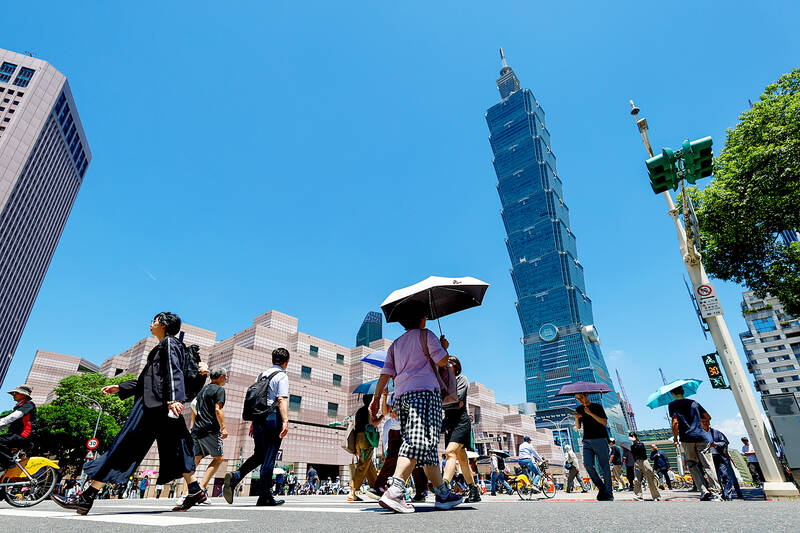Taiwan ranked third in the Asia-Pacific region in the “IMD World Talent Ranking 2025” report, rising one spot to 17th place overall, the report released on Tuesday by the Switzerland-based International Institute for Management Development (IMD) showed.
In the Asia-Pacific region, Taiwan trailed behind Hong Kong, which ranked fourth globally, and Singapore, which was seventh overall.
Taiwan ranked above South Korea, China and Japan, which ranked 37th, 38th and 40th respectively.

Photo: Ritchie B. Tongo, EPA
Globally, the report also ranked Taiwan above the US at 22nd place and the UK at 30th.
In the subcategories, Taiwan was listed 21st in investment and development, 16th in appeal and 11th in readiness, among the 69 economies ranked by the institute.
The subcategories assess a country or territory on investment and development of homegrown talent, the country’s appeal to local and overseas talent, and the degree of skills and competencies in its talent pool.
The IMD report said that financial security and tangible benefits are the most frequently cited drivers for international relocation in the post-COVID-19 pandemic era, as geopolitical instability, inflation and cost-of-living pressures reshape executives’ willingness to relocate abroad.
Globally, Switzerland maintained its decade-long dominance in the rankings, followed by Luxembourg and Iceland. Rounding out the top five, after Hong Kong, is the Netherlands.
Sweden, Singapore, Denmark, the United Arab Emirates and Austria followed in the sixth through 10th places respectively.
The IMD is an independent academic institute “with close ties to business and a strong focus on impact,” its Web site says.

The Chinese military has built landing bridge ships designed to expand its amphibious options for a potential assault on Taiwan, but their combat effectiveness is limited due to their high vulnerability, a defense expert said in an analysis published on Monday. Shen Ming-shih (沈明室), a research fellow at the Institute for National Defense and Security Research, said that the deployment of such vessels as part of the Chinese People’s Liberation Army (PLA) Navy’s East Sea Fleet signals a strong focus on Taiwan. However, the ships are highly vulnerable to precision strikes, which means they could be destroyed before they achieve their intended

The Taiwan Experience Education Program (TEEP) has funded short-term internships in Taiwan for more than 4,500 young people from more than 40 countries since 2015, with the goal of attracting and retaining international talent, the Ministry of Education said yesterday. Fifty-five colleges launched 514 projects this year, including in fields such as semiconductors, artificial intelligence, medicine and biotechnology, green energy, and sustainability, it said. The program provides research and practical internships in Taiwan for two to six months, and offers cultural exchange and networking opportunities, the ministry said. For example, National Formosa University’s Embedded System and Autopilot Laboratory developed two solar-powered drones in

GLOBAL: Although Matsu has limited capacity for large numbers of domestic tourists, it would be a great high-end destination for international travelers, an official said Lienchiang County’s (Matsu) unique landscape and Cold War history give it great potential to be marketed as a destination for international travelers, Tourism Administration Director General Chen Yu-hsiu (陳玉秀) said at the weekend. Tourism officials traveled to the outlying island for the Matsu Biennial, an art festival that started on Friday to celebrate Matsu’s culture, history and landscape. Travelers to Matsu, which lies about 190km northwest of Taipei, must fly or take the state-run New Taima passenger ship. However, flights are often canceled during fog season from April to June. Chen spoke about her vision to promote Matsu as a tourist attraction in

Taipei resident Mu Chu-hua caught some glimpses of China’s mighty military parade on YouTube on Wednesday. As she watched hypersonic missiles roll down Beijing’s Changan Avenue and troops march in lockstep, she did not feel like they posed a threat to Taiwan. Mu, a 69-year-old retiree, said she saw the parade as simply a way for Chinese President Xi Jinping (習近平) to “say thank you to the troops.” “I thought it was quite normal,” she said. “It was very cool.” China’s military parade commemorating the end of World War II was being watched internationally for insights into Beijing’s military advances and its show